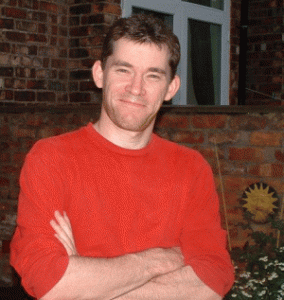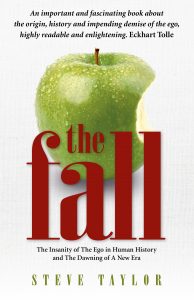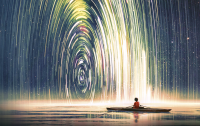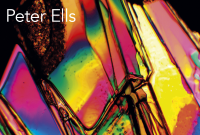
 by Steve Taylor
by Steve Taylor
The Fall was originally published in the UK in 2005. I started to write it in the summer of 2001 - I have a very vivid memory of taking a break
from writing Chapter 4 of the book, switching on the radio and hearing about the terrorists attacks on the World Trade Center in New York, in September 2001. However, I had been researching the book
for a long time before then. For several years, I had been reading books on anthropology and archaeology and making notes in my journals. I had always been intrigued by the psychological differences
between indigenous peoples (like American Indians, Australian Aborigines or the tribal peoples of Polynesia) and modern western or ‘civilised’ peoples. Most notably, I was struck by their different
relationship to the natural world - indigenous people’s respectful attitude to nature, and their sense of its sacredness and aliveness, compared to modern people’s exploitative attitude to it.
Indigenous peoples seemed to have a sense of connection to nature which we have lost. We seem to exist in separation from the natural world, whereas they were intimately bonded with it.
I began to sense that a major psychological shift had occurred at some point in human history, when a new sense of separation and individuation had developed. The more I read, the more evidence I
found for this. I had an experience that I’ve never had with any other book - The Fall came into being so easily and inevitably that I felt like
I was somehow being helped and guided. I felt that I was being steered in the direction of all the material I needed. The structure of the book took shape so naturally that it felt as if it had
already been arranged. Ideas and theories streamed into my mind more quickly than I could write them down. As a result, the book was very easy to write. I felt like it was coming through me, rather
than from me. I would hesitate to say that I felt that it was channelled - there was too much personal volition (and too much hard work!) involved in it for that. Perhaps it had been forming in my
subconscious mind for many years, and so was ready to emerge.
The basic idea of The Fall is simple: there was a certain point in history when some human groups developed a strongly individuated sense of
self. This is what I call ‘The Ego Explosion.’ This new ego was responsible for major cultural changes, including the onset of constant warfare, male domination, hierarchical societies, theism, and
so on. There was a new sense of separation from the world, a new sense of ‘ego-isolation,’ which created an existential anxiety, and an impulse to accumulate wealth and status. The last few thousand
years of human history - with its incredible brutality and oppression and its atmosphere of psychological discord and desire for escape - can be explained in these terms. However, in recent times -
particularly over the last three centuries - we have begun to transcend this strong sense of ego. A new sense of empathy has developed, and a new sense of connection to nature. More and more people
have felt an impulse to transcend their strong separate egos by following spiritual practices and paths. We have entered what I call the ‘trans-Fall’ era.
Over the last 11 years, I have been pleased that many of the book’s findings have been supported by further evidence. Much more evidence has  appeared suggesting that our prehistoric
hunter-gatherer ancestors were not war-like savages, but peaceful and egalitarian. This has become more widely accepted amongst anthropologists than ever before, and is now close to the consensus
view. For example, in 2014, a study of 21 contemporary hunter-gatherer groups by the anthropologists Fry and Soderberg (1) showed a striking lack of evidence for inter-group conflict over the last
hundred years. There was only one society (the Tiwi, an Australian Aboriginal group) who had a history of group killings. In another study focused on prehistory, the anthropologist Brian Ferguson
carried out a detailed survey of Neolithic Europe and the near East, and found almost no evidence of warfare (2). A recent survey of almost 3000 prehistoric skeletons found that there was only one
significant incident of group killing (a site in Sudan in which two dozen people were killed); otherwise only four skeletons showed signs of violence - and even these signs were consistent with
homicide rather than warfare. (3) Other recent research has shown that in contemporary hunter-gatherer groups, men and women tend to have equal status and influence, leading to the suggestion that
sexual inequality only began to emerge with the development of agriculture. (4)
appeared suggesting that our prehistoric
hunter-gatherer ancestors were not war-like savages, but peaceful and egalitarian. This has become more widely accepted amongst anthropologists than ever before, and is now close to the consensus
view. For example, in 2014, a study of 21 contemporary hunter-gatherer groups by the anthropologists Fry and Soderberg (1) showed a striking lack of evidence for inter-group conflict over the last
hundred years. There was only one society (the Tiwi, an Australian Aboriginal group) who had a history of group killings. In another study focused on prehistory, the anthropologist Brian Ferguson
carried out a detailed survey of Neolithic Europe and the near East, and found almost no evidence of warfare (2). A recent survey of almost 3000 prehistoric skeletons found that there was only one
significant incident of group killing (a site in Sudan in which two dozen people were killed); otherwise only four skeletons showed signs of violence - and even these signs were consistent with
homicide rather than warfare. (3) Other recent research has shown that in contemporary hunter-gatherer groups, men and women tend to have equal status and influence, leading to the suggestion that
sexual inequality only began to emerge with the development of agriculture. (4)
I also feel that that the ‘trans-Fall’ movement has intensified over the last decade. Interest in spiritual teachings and spiritual practices has increased massively. It seems that more and more
people are feeling the impulse to transcend our strong sense of ego, and re-connect with nature and the cosmos. In my research as a transpersonal psychologist, I have become surprised at how common
cases of spiritual awakening are. My research has mainly focused on spiritual awakening triggered by intense psychological turmoil, as described in my book Out of the Darkness. I have found that this
experiences most often happen to ordinary people who know nothing about spirituality. (As a result, it sometimes takes them a long time to understand what has happened to them.) It’s almost as if our
normal ‘sleep’ state is losing its hold over us as a species, and slipping away, and a new, higher functioning awakened state is slowly emerging in its place.
In my reading over the last few years, I’ve become aware of many other interesting facts and findings that I would probably include in the book if I re-wrote it now. For example, I have become aware
that a sense of the aliveness and sacredness of the phenomenal world, and the awareness of a ‘spirit-force’ pervading it, is by no means confined to indigenous and prehistoric peoples. Such world
views are still common amongst the most technologically developed peoples of East Asia, such as Japan and Korea. In Japanese culture, the natural world is alive with kami, non-physical forces
(sometimes translated as ‘spirits’) which are manifestations of musubi, the interconnecting creative spiritual force of the universe. Similarly, in Korea, the world is alive with shin, and the terms
haneullim or hwanin refer to an all-pervading divine force or principle. (Literally, haneullim means ‘source of all being.’)
 Such cultures are also much less individualistic and more communally-oriented
than modern western cultures. According to one anthropologist, in Vietnam, the concept of an ‘individual’ didn’t enter into language until the 20th century, and then only in a negative sense, to
describe selfish behaviour. (5) It seems that East Asian cultures in particular have retained aspects of the ‘unfallen’ state of being, and never fell so intensely into egoic separateness as other
cultures. More and more it seems to me that the western de-spiritualised vision of the world - which sees nature just as a supply of resources, and perceives living beings as nothing more than
chemical machines - is an aberration, produced by a pathological state of separation.
Such cultures are also much less individualistic and more communally-oriented
than modern western cultures. According to one anthropologist, in Vietnam, the concept of an ‘individual’ didn’t enter into language until the 20th century, and then only in a negative sense, to
describe selfish behaviour. (5) It seems that East Asian cultures in particular have retained aspects of the ‘unfallen’ state of being, and never fell so intensely into egoic separateness as other
cultures. More and more it seems to me that the western de-spiritualised vision of the world - which sees nature just as a supply of resources, and perceives living beings as nothing more than
chemical machines - is an aberration, produced by a pathological state of separation.
I have no desire to rewrite The Fall though. I’m happy with the book as it is. I’m happy that it’s attracted a great deal of interest over the
years, and that it is still being discovered by more and more readers. I’m happy that I regularly receive e-mails from new readers, telling me that the book has changed the way they see the world,
even changed their lives, made them understand the human race better, and made them feel more optimistic about the future. The book has struck such a deep chord in so many people that I feel that it
must be confirming knowledge which was already inside all us - truths that we have forgotten but which were always part of our collective unconscious. Perhaps we all sense, deep down, that the fall
was an aberration, and that human beings’ true nature is not to be full of discord and to create so much conflict. Perhaps we all sense, deep down, that this bleak and chaotic phase of human history
is only temporary, and that we are slowly entering a new, brighter, more harmonious phase.
References
(1) Fry, D. & Söderberg, P. (2014). ’Myths about Hunter-Gatherers Redux: Nomadic Forager War and Peace.’ Journal of Aggression, Conflict and Peace Research 6 (2014.):255-66.
(2) Ferguson, R. B. (2013). ‘The Prehistory of War in Europe and the Near East.’ In War, Peace, and Human Nature, edited by Douglas P. Fry, pp. 473–7. New York: Oxford University Press.
(3) Haas, J. & Piscitelli, M. (2013). ‘The Prehistory of Warfare: Misled by Ethnography and Ethology.’ In War, Peace, and Human Nature, edited by Douglas P. Fry, pp. 168-190. New York: Oxford University Press.
(4) Dyble, M et al. (2015) ‘Sex equality can explain the unique social structure of hunter-gatherer bands.’ Science, 15 May 2015: 796-798
(5) Marr, D. (2000). Concepts of 'Individual' and 'Self' in Twentieth-Century Vietnam. Modern Asian Studies, 34(4), 769-796.
Steve Taylor PhD is a senior lecturer in psychology at Leeds Metropolitan University. He is the author of several best-selling books on spirituality and psychology, including The Fall, The Calm Centre, Waking From Sleep, Out of the Darkness and Back to Sanity.
His latest book for O Books is Not I, Not Other than I. The life and teachings of Russel Williams. Russel Williams is one of the most remarkable enlightened spiritual teachers of our time. After an early life of extreme hardship – leaving school at the age of 11, and becoming an orphan shortly afterwards – he underwent a spiritual awakening at the age of 29. Since the late 1950s, he has been a spiritual teacher, and is still actively teaching now, at the age of 94. Previously, Russel has avoided publicity and never published any writings or transcripts of his talks, preferring to work quietly with small groups. This is the first time any details of his teachings or of his life have appeared in print. This book is partly a record of his teachings, and partly also the story of his extraordinary life. Working with well-known spiritual author Steve Taylor – who has attended Russel’s meetings regularly since the 1990s – Russel has created a profound text which will surely become known as a classic of spiritual literature.
Steve Taylor is also a poet, and the author of The Meaning: Poetic and Spiritual Reflections.
Steve was recently included (at no. 38) in Mind, Body, Spirit magazine’s list of the ‘100 most spiritually influential living people.’ Eckhart Tolle has referred to his work as ‘an important
contribution to the global shift in awakening.’ www.stevenmtaylor.co.uk
Listen to Steve talking about his spiritual journey on Youtube
Categories:
0 comments on this article







